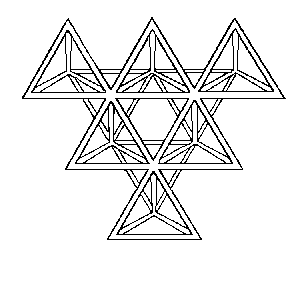
Return to Mark/Space
ISBN 0-14-003506-0 (UK pbk, 1972)
novel, science fiction, evolution, posthuman, transhuman, space migration, future
This book was reissued in 1972 as an omnibus edition together with Last Men in London . Preface by Olaf Stapledon [extract below].
"In Last and First Men Olaf Stapledon carries man's story on through the deadline and re-emergence of the human species in new forms, on new planetary homes, until the dying sun foreshadows the end of the solar system.
"This is not 'space opera' science fiction but a brilliant treatise in fictional form on scientific and ethical possibilities, a work out-pacing in imagination and credibility anything bar the best of Wells and Verne." [jacket blurb, UK pbk, 1972]
"This is Stapledon's early, and rather wordy, treatise on the human and posthuman condition. A theme he would later express more succinctly in his excellent novel Star Maker . Still, this amazing and philosophical tale is remarkable for its scope. Stapledon transcends the moment to show the human race in a cosmic perspective". --Henry W.Targowski (in Mark/Space , 23 November 1995)
Recommended.
This is a work of fiction. I have tried to invent a story which may seem a possible, or at least not wholly impossible, account of the future of man; and I have tried to make that story relevant to the change that is taking place today in man's outlook.
To romance of the future may seem to be indulgence in ungoverned speculation for the sake of the marvellous. Yet controlled imagination in this sphere can be a very valuable exercise for minds bewildered about the present and its potentialities. Today we should welcome, and even study, every serious attempt to envisage the future of our race; not merely in order to grasp the very diverse and often tragic possibilities that confront us, but also that we may familiarize ourselves with the certainty that many of our most cherished ideals would seem puerile to more developed minds. To romance of the far future, then, is to attempt to see the human race in its cosmic setting, and to mould our hearts to entertain new values.
But if such imaginative construction of possible futures is to be at all potent, our imagination must be strictly disciplined. We must endeavour not to go beyond the bounds of possibility set by the particular state of culture within which we live. The merely fantastic has only minor power. Not that we should seek actually to prophesy what will as a matter of fact occur; for in our present state such prophecy is certainly futile, save in the simplest matters. We are not set up as historians attempting to look ahead instead of backwards. We can only select a certain thread out of the tangle of many equally valid possibilities. But we must select with a purpose. The activity that we are undertaking is not science, but art; and the effect that it should have on the reader is the effect that art should have.
Yet our aim is not merely to create aesthetically admirable fiction. We must achieve neither mere history, nor mere fiction, but myth. A true myth is one which, within the universe of a certain culture (living or dead), expresses richly, and often perhaps tragically, the highest admirations possible within that culture. A false myth is one which either violently transgresses the limits of credibility set by its own cultural matrix, or expresses admirations less developed than those of its culture's best vision. This book can no more claim to be true myth than true prophecy. But it is an essay in myth creation.
The kind of future which is here imagined, should not, I think, seem wholly fantastic, or at any rate not so fantastic as to be without significance, to modern western individuals who are familiar with the outlines of contemporary thought. Had I chosen matter in which there was nothing whatever of the fantastic, its very plausibility would have rendered it unplausible. For one thing at least is almost certain about the future, namely, that very much of it will be such as we should call incredible. In one important respect, indeed, I may perhaps seem to have strayed into barren extravagance. I have supposed an inhabitant of the remote future to be communicating with us of today. I have pretended that he has the power of partially controlling the operations of minds now living, and that this book is the product of such influence. Yet even this fiction is perhaps not wholly excluded by our thought. I might, of course, easily have omitted it without more than superficial alteration of the theme. But its introduction was more than a convenience. Only by some such radical and bewildering device could I embody the possibility that there may be more in time's nature than is revealed to us. Indeed, only by some such trick could I do justice to the conviction that our whole present mentality is but a confused and halting first experiment. --Olaf Stapledon (extract from the preface, West Kirby, July 1930).
|
|
|

Return to Mark/Space